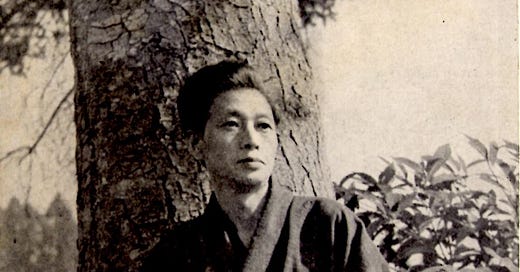Democratic Education
(Die in Obscurity)
Hideo Kobayashi
In schools, there has been much discussion about education in writing. In youth groups and other groups, writing is called the "life record" exercise. The number of young people who have been taught to write is increasing. When we read roundtable discussions on writing education, educators are unanimous: students nowadays are used to watching films, listening to the radio, reading comics and illustrated stories, and absorbing a lot of miscellaneous knowledge in a flurry of hand-waving. And although they speak a lot, they are becoming less and less proficient at writing. In such a situation, the ability to think, feel, and judge on one's own deteriorates further. The ability to check one's own mind must be cultivated through the effort to put one's thoughts and feelings into writing. That is my opinion. It is a sound idea that the aim of education, to put it into today's fashionable terms, is to develop students' independence, but in practice, the troublesome problem of where to find a role model for writing quickly arises.
In the past, there were beautiful essays written by experts in writing as models for composition, but nowadays all experts in writing seem to hate writing and are are terrible at it. Writing, they all say, is not about setting a model for students' writing, but about checking oneself. And not just a vague idea of who they are. Trying to confirm a dubious idea confuses the text. The flower of the author's talent can only blossom on top of this confusion. Last year, an 18-year-old Frenchwoman called F. Sagan wrote a novel called 'Grief, Hello,' which won the Grand Prize for Criticism. It was a bestseller in France and the USA, and has recently been translated into Japanese and has become a bestseller, as well. I was more interested in the irresistible appeal of this novel to young people than in its appeal to me, but it is true that these novels bloomed on confusion. This is probably a typical example of such a mysterious flower. She is undoubtedly a rare talent, but everything is a collection of the unstable observations and random opinions of a precocious girl, and even if there were mistranslations on every page, the reader would pass it by, and the charm of the text would be the same. Perhaps the person who has the least faith in the original text is the original author. I even thought about it. I am all alone, so there is no one to say "hello" to. I have no choice, so I say things like "Grief, hello." And so on. Is it the writer's autonomy? Is it the new type of beautiful writing created by the writer?
I don't need a model for writing. I met a young composition teacher the other day who passionately insisted that the aim of composition is to let students write freely and honestly about what they think is important, but my objection that this kind of thinking is responsible for the flood of weird and dubiously beautiful writing today was not enough to convince him. A role model is still indispensable. This is not to say that they are difficult to find. Today's art teachers may find it difficult to encourage their students to copy famous paintings, but they cannot discard the basics of the drawing. The same is true of composition education, which should also be based on accurate sketches. The subject of the sketch should be a definite external object, and not an amorphous image of one's own mind. If students become good at such things, they will enjoy getting lost in random ideas and will eventually stop believing in their own individuality. However, my objection seemed to the teacher to be a weak protest. I thought secretly that the democratic education method must have been too easy a discovery for this person. Even if the theory is correct, a zealous advocate of the theory is not suited to the patient, calm art of education. For he reads his own face in the faces of his students.
(27 July 1955)


